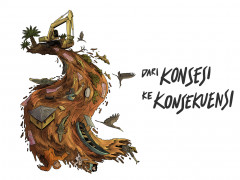Alert of Forest and Land Fire Vulnerability in 2022
By Oriz Anugerah Putra, Agiel Prakoso dan Iola AbasSupporting Conditions for Peat Restoration in Preventing Land and Forest Fires
The Pantau Gambut team sees the need to ensure supporting conditions for effective implementation of peat restoration in order to restore peat conditions and prevent fires from spreading. These conditions include, among others, implementing restoration according to plan while taking into account the interests of the affected communities, funding for fire prevention and infrastructure maintenance, and the active role of all parties down to the site level. This recommendation is based on field observations conducted by the Pantau Gambut team throughout March 2019 in 10 villages and subdistricts across Dumai City, Bengkalis District, Meranti Islands District, and Rokan Hilir District in the Province of Riau. These locations were chosen as they are areas where fires still occur despite supposedly having received restoration intervention according to planning documents. Peat fires in these regions, however, are not only rooted in one problem, but triggered by a number of main causes.
Pekanbaru, July 4, 2019: The Pantau Gambut team deems a number of supporting conditions necessary for effective peat restoration and fire prevention. These supporting conditions include, among others, implementing restoration according to plan while taking into account the interests of the affected communities, funding for fire prevention and infrastructure maintenance, and the active role of all parties down to the site level.
The recommendation is based on field observations conducted by the Pantau Gambut team throughout March 2019 in 10 villages and subdistricts across Dumai City, Bengkalis District, Meranti Islands District, and Rokan Hilir District in Riau. These locations are priority areas for peat restoration.
Based on field observations in the 10 villages and subdistricts, the team found that:
- Fires no longer occur in areas that have received peat rewetting intervention over a long period of time with active community involvement in maintaining infrastructure for restoration and fire prevention, as in the case of Tanjung Leban Village, Bengkalis. Furthermore, there are positive indications of reduced fires in Sungai Sigajah Village and Tanjung Leban Village in Rokan Hilir following the construction of peat rewetting infrastructure at the end of 2018.
- Fires still occur in some areas that are close to where rewetting infrastructure is located, an early indicator that it might take time for restoration intervention to increase the wetness of surrounding land.
- Fires still occur in intervention areas where the location of the infrastructure is far from the location of fire/hot spots
- Fires still occur in areas where planned restoration has not been realized
Isnadi Esman, Secretary General of the Riau Peat Community Network (JMGR) underlined the ineffectiveness of some of the existing infrastructure. Rewetting peat that is already too dry takes time, while the existing infrastructure is still relatively new.
“This is exacerbated by ineffective coordination and prevention efforts, non-existent or late disbursement of operational funds, and difficulty in accessing the fire sites,” he said during a public discussion on Report on Peat Fires in Restoration Intervention Areas in Riau, in Pekanbaru, today.
Romes Irawan Putra, Director of Kaliptra Andalas who is also the Coordinator of the Pantau Gambut Network Node in Riau, proposes ten recommendations to improve these supporting conditions so that other regions can follow the success stories in the three villages.
These recommendations include carrying out peat restoration according to plan, ensuring that peat rewetting infrastructure is built in fire-prone areas, and formulating recovery indicators as a reference for the general public. Other recommendations include: ensuring maintenance of existing infrastructure, and strengthening fire patrol and prevention at the site level,
ensuring the availability of fire prevention funds at village and kelurahan levels, encouraging villages and kelurahan to open collaboration with external funding sources, ensuring supervision and enforcement of regulations on restoration plans in concession areas, improving implementation of plans that involve the community (FPIC), and conducting socialization of fire prevention by accommodating and paying attention to local wisdom.
“These recommendations must be accompanied by strategic steps from the local government, namely by establishing a special policy from the provincial government on peat restoration. The governor needs to revise the decree on the regional peatland restoration team by involving local communities and organizations that have been working in this field,” said Romes.
Pantau Gambut National Coordinator, Iola Abas, added that all parties need to be prepared to deal with the possibility of peat fires during the peak of the dry season.
“Further monitoring is needed to see if fire will occur in the intervention areas during the peak dry season period in August-September 2019. We must focus on areas whose conditions are still vulnerable, namely areas with recently built infrastructure, and areas that have not been able to take effective prevention and maintenance efforts,” she concluded.



